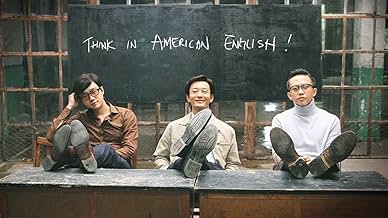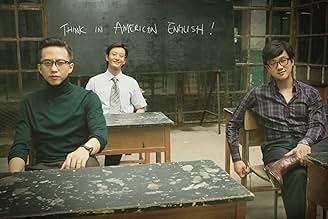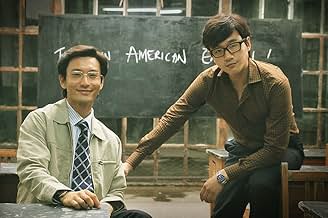IMDb-BEWERTUNG
6,9/10
3023
IHRE BEWERTUNG
Füge eine Handlung in deiner Sprache hinzuThree ambitious friends establish a thriving English school in China, helping local teens pursue their aspirations. Their journey to success on Wall Street involves numerous challenges and m... Alles lesenThree ambitious friends establish a thriving English school in China, helping local teens pursue their aspirations. Their journey to success on Wall Street involves numerous challenges and memorable experiences.Three ambitious friends establish a thriving English school in China, helping local teens pursue their aspirations. Their journey to success on Wall Street involves numerous challenges and memorable experiences.
- Regie
- Drehbuch
- Hauptbesetzung
- Auszeichnungen
- 31 Gewinne & 32 Nominierungen insgesamt
Tina Collins
- Girlfriend
- (Synchronisation)
Empfohlene Bewertungen
I thought Chan Ho-sun's latest movie, American Dreams in China, would be a more masculine version of Zhao Wei's So Young. But not quite, as it turns out.
Although the film depicts a nostalgic campus life full of idealism for the future and the impulses of love, the story is more about starting out after innocent youth has faded.
Through the intertwined destinies of the movie's protagonists, the audience witnesses a triangle of friendship, career ambitions and personal dreams seemingly collapse as three best friends desperately try to tie and twist these elements together.
That's why Wang Yang (Tong Dawei), one of the three best friends, who start a business together, shares this lesson of life: "Never start a business with your best friends."
He may be right. After all, no matter how close they are, differences in their professional and personal aspirations can drive friends apart. Every individual has a distinct outlook on the world and their future, which determines the trajectory of their career and life.
Without knowing of Meng Xiaojun's (Deng Chao) struggles in the US and his disillusion toward the country, there's no way Cheng Dongqing (Huang Xiaoming) can understand why Meng is pushing all the agendas so hard. The parting of the invincible trio, to some extent, is predestined.
Even so, despite these differences, friendship always prevails. Cheng's difficulties become a podium on which the three friends stand together. It's through the emotional connection they developed over many years that they finally overcome their differences and reform the alliance.
What the film tries to convey is the triumph of brotherhood, which dates back to our naive, passionate youth when unconditional bonds of emotion are shaped.
So the film was never about business after all.
Although the film depicts a nostalgic campus life full of idealism for the future and the impulses of love, the story is more about starting out after innocent youth has faded.
Through the intertwined destinies of the movie's protagonists, the audience witnesses a triangle of friendship, career ambitions and personal dreams seemingly collapse as three best friends desperately try to tie and twist these elements together.
That's why Wang Yang (Tong Dawei), one of the three best friends, who start a business together, shares this lesson of life: "Never start a business with your best friends."
He may be right. After all, no matter how close they are, differences in their professional and personal aspirations can drive friends apart. Every individual has a distinct outlook on the world and their future, which determines the trajectory of their career and life.
Without knowing of Meng Xiaojun's (Deng Chao) struggles in the US and his disillusion toward the country, there's no way Cheng Dongqing (Huang Xiaoming) can understand why Meng is pushing all the agendas so hard. The parting of the invincible trio, to some extent, is predestined.
Even so, despite these differences, friendship always prevails. Cheng's difficulties become a podium on which the three friends stand together. It's through the emotional connection they developed over many years that they finally overcome their differences and reform the alliance.
What the film tries to convey is the triumph of brotherhood, which dates back to our naive, passionate youth when unconditional bonds of emotion are shaped.
So the film was never about business after all.
During the economic reform period of the 80's, three friends bind together by a common ambition – to live the American dream. The three leads Huang Xiao Ming, Deng Chao and Tong Dawei create a very believable camaraderie. It is possible to be happy for your friend doing well and envy him at the same time, and that is the central story between these three friends. Huang Xiao Ming brings his best performance thus far. He's not busy preening for the camera and posing a pretty boy as I have seen in his past works. It's partly the role itself as it asks Huang to start by playing a vulnerable teenage boy who eventually that ages into a man.
There's a trend of using very fast cuts in Mainland comedies right now. It originated with Ning Hao's 2006 heist comedy Crazy Stone - which drew its visual style from Guy Ritchie - and now it has officially embedded itself genetically as filmic grammar for Chinese comedic dialogue. There's a scene where two of the friends had a fight and complain about each other individually with the third friend over a ping pong game. The cutting is so fast between conversation A and conversation B that it's impossible for the audience to really feel what these characters are going through. These montages will happen every now and then to speed the story ahead. It's zany for sure, but at times I wish they would let the scenes breathe instead of zeroing in for laughs.
That said, it's smart on Peter Chan's part of picking up on this trend and using it here because American Dreams in China is a Mainland Chinese story made for the Mainland audience. The content may prove more difficult with English-speaking audiences whom aren't aware of the cultural context or why the 3 friends carry the values they do about America and the American Dream to laugh at it whole-heartedly.
Suffice to say, Chan balances the film well and it is impressive to see a Hong Kong director tune to a Mainland frequency. Best thing I can say about Peter Chan's direction is that he is worldly. He doesn't portray Americans as white devils, which makes things more interesting and engaging. American Dreams in China will connect with its audience, namely Chinese people who were born in the 80's, and those people will enjoy it. Everybody else I am not so sure but this is a nice gem of a film nonetheless.
For more reviews, please visit my blog @ http://hkauteur.wordpress.com
There's a trend of using very fast cuts in Mainland comedies right now. It originated with Ning Hao's 2006 heist comedy Crazy Stone - which drew its visual style from Guy Ritchie - and now it has officially embedded itself genetically as filmic grammar for Chinese comedic dialogue. There's a scene where two of the friends had a fight and complain about each other individually with the third friend over a ping pong game. The cutting is so fast between conversation A and conversation B that it's impossible for the audience to really feel what these characters are going through. These montages will happen every now and then to speed the story ahead. It's zany for sure, but at times I wish they would let the scenes breathe instead of zeroing in for laughs.
That said, it's smart on Peter Chan's part of picking up on this trend and using it here because American Dreams in China is a Mainland Chinese story made for the Mainland audience. The content may prove more difficult with English-speaking audiences whom aren't aware of the cultural context or why the 3 friends carry the values they do about America and the American Dream to laugh at it whole-heartedly.
Suffice to say, Chan balances the film well and it is impressive to see a Hong Kong director tune to a Mainland frequency. Best thing I can say about Peter Chan's direction is that he is worldly. He doesn't portray Americans as white devils, which makes things more interesting and engaging. American Dreams in China will connect with its audience, namely Chinese people who were born in the 80's, and those people will enjoy it. Everybody else I am not so sure but this is a nice gem of a film nonetheless.
For more reviews, please visit my blog @ http://hkauteur.wordpress.com
Technically I think this movie's made very well, but its message is very nationalistic and panders to the Chinese Communist Party and the masses (which is fair enough I suppose for a commercial film).
Especially the film's latter half focuses on the rise of China, and there is a clear message that Chinese people are inherently cleverer, more moral and generally better than stupid Americans who are only economically at the top due to their aggressiveness and luck. There's also a very odd message in the film about racism in the USA, which seems quite irrelevant to the plot of the film and just another way for the film to push home the message that Chinese people are a better people than Americans.
If you don't read into the message too much (which is hard considering how hard it's pushed home), it's quite an enjoyable film of three young men's struggle and rise to the top.
Especially the film's latter half focuses on the rise of China, and there is a clear message that Chinese people are inherently cleverer, more moral and generally better than stupid Americans who are only economically at the top due to their aggressiveness and luck. There's also a very odd message in the film about racism in the USA, which seems quite irrelevant to the plot of the film and just another way for the film to push home the message that Chinese people are a better people than Americans.
If you don't read into the message too much (which is hard considering how hard it's pushed home), it's quite an enjoyable film of three young men's struggle and rise to the top.
Music is especially good. The plot was exciting, but the story was told in a hurry. There is no nostalgic long lens, all rely on narration to inculcate, or ultimately ended. Tong Dawei is still that poker face, and the sense of integration with the characters is still so poor. Huang Xiaoming is either crying or laughing. After all, acting is an entry point. Deng Chao is the only one who seems to be performing.
A person is bound to act strangely when losing at love and life. Some channel the failure into better things. In a true story, three entrepreneurs take some lumps from classrooms, random grouches, consulates, love, and each other, and manage to turn things around. They come up from depths of despair with jewels found in their hearts. With straight talk, humor and personal stories, these three turn English language classes in an abandoned factory, along with broken dreams, into a billion dollar empire. While ripe with awkward moments, inadequately developed themes, and scenes that are difficult to translate, this is a compelling tale, finely portrayed, of dealing with adversity, following your bliss and hidden talents, and letting the rest go. Seen at the 2014 Miami International Film Festival.
Wusstest du schon
- VerbindungenReferenced in Ben Pao Ba Xiong Di: Mi Mi He Huo Ren (2015)
Top-Auswahl
Melde dich zum Bewerten an und greife auf die Watchlist für personalisierte Empfehlungen zu.
Details
Box Office
- Weltweiter Bruttoertrag
- 87.097.067 $
- Laufzeit
- 1 Std. 52 Min.(112 min)
- Farbe
- Sound-Mix
- Seitenverhältnis
- 2.35 : 1
Zu dieser Seite beitragen
Bearbeitung vorschlagen oder fehlenden Inhalt hinzufügen






















